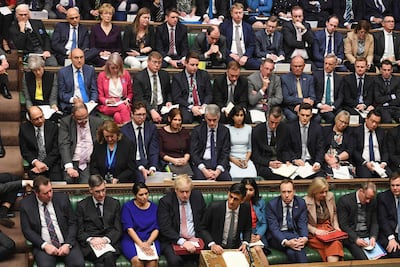The former British prime minister Benjamin Disraeli called it the greasy pole, an expression to capture the trickiness of the ascent to the top job in UK politics. These days it is not unfair to remark that the route is best begun a few generations back in India, moving through East Africa and culminating in Westminster.
That is certainly the backstory of Rishi Sunak, who last week made an assured debut as Chancellor of the Exchequer, the British equivalent of the finance minister, when he presented the national budget.
Mr Sunak is essentially the man who opens and shuts the nation's purse strings, but the circumstances faced by the 39-year-old former hedge fund manager were truly daunting. The onset of the coronavirus has completely shredded any credible figures for setting the budget. The only certainty is that there will be a downturn.
But Mr Sunak was clear and bold. Observers compared his confident delivery and manner to George Osborne, the austerity-era chancellor who came into office 10 years ago.
Mr Osborne was born into British and Irish aristocracy, and he could have expected to fulfil his ambitions in the establishment-friendly, right-wing Conservative Party. Mr Sunak, though, comes from a different background.
His grandparents were born in Punjab and moved to East Africa in the colonial era. They migrated to Britain in the 1960s. The family was aspirational: Mr Sunak’s parents are a doctor and a pharmacist, and they funded his way through the 12th-century private school, Winchester College. As a Fulbright scholar in Stanford, California, Mr Sunak met Akshata Murthy, daughter of Narayana Murthy, who co-founded the IT company Infosys and is one of India’s richest and most celebrated men.
The key images of budget day in the UK told the story of advancement across the top of politics. Prime Minister Boris Johnson, who boasts that he fortuitously posted his ancestors across the world, sat in the House of Commons next to Mr Sunak. They were joined by Home Secretary Priti Patel, also a product of the journey from India through East Africa to the UK, and Attorney General Suella Braverman, who has roots in India, Mauritius and East Africa.
An hour earlier, when Mr Sunak led his Treasury ministerial colleagues out of Number 11 Downing Street, there was also at his side Kemi Badenoch, born in Wimbledon to Nigerian parents and now a member of Parliament.
The changing of the guard comes at time when the challenges are not just a massive downturn as a result of coronavirus.
The phrase "levelling-up” has informed all politics since the general election in December. The emphasis is on addressing an imbalance in prosperity and opportunity between the country's north and south.
The economic think tanks have welcomed Mr Sunak's first budget, with commentators largely agreeing on the need to ensure that people who are poor are not beset by other problems. There is a crisis of the social fabric and radically new thinking is necessary.
Mr Sunak is known to be enthusiastic about putting in place structures for areas that have lagged. These include freeports, where imports and exports are untaxed or come in and out at concessionary rates. He is also a promoter of opportunity zones, hotspots with an emphasis on attracting private capital that are designed to unleash catch-up growth.
The 15 million of Britain’s nearly 70 million people, who find themselves in poverty, depend on his economic policies to deliver a brighter future. For these groups, the issues go wider than spending power and wealth. According to analysis by the London-based think tank Legatum Institute, nearly half of those in poverty live in families where one person is disabled, while one third of them belong to families in which one member reported poor mental health.

Therefore, the drivers of economic policy call for a more compassionate approach and the search is on for incentives that deliver a different economic and social compact.
The signs are that Mr Sunak wants his efforts to be about more and better jobs across the country. In his opening remarks, he recalled that he had himself been in the job for just 27 days. The promotion had come about after the resignation of Sajid Javid, born of parents from Pakistan, following a dispute with Mr Johnson over advisers.
While the scheduled budget went ahead despite that upheaval, coronavirus made it very different in tone from Mr Javid's script. With his eyes on the longer term, Mr Sunak said employment was the key metric to judge his work. "Given the last few weeks I've had, I'm all in favour of jobs miracles," he joked.
Charm and enthusiasm for a one-nation approach were the hallmarks of Mr Disraeli, a figure of the 19th-century and a man with Jewish roots that should have counted him out at that time. Mr Sunak has a winning manner and a palpable air of ambition. The Daily Mail newspaper asked with some mischief if the new chancellor was Mr Johnson's successor.
Barring missteps, it is a question that is likely to be heard with increasing urgency over time.
Damien McElroy is the London bureau chief of The National



